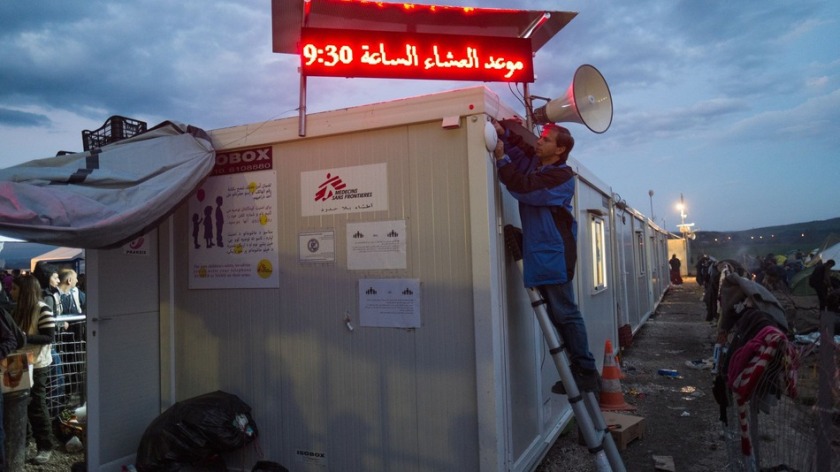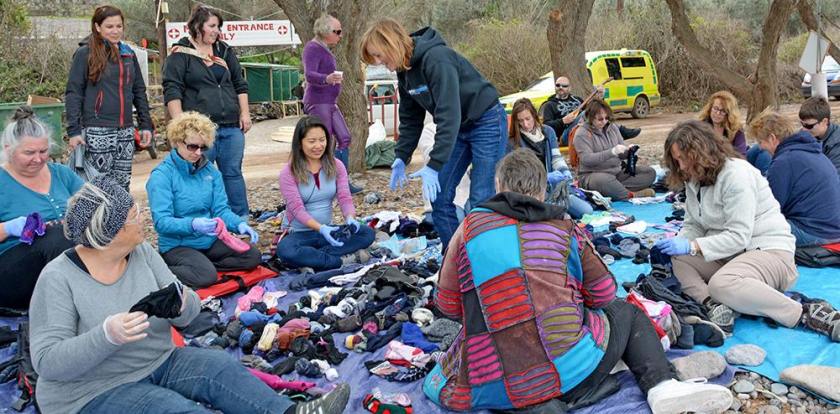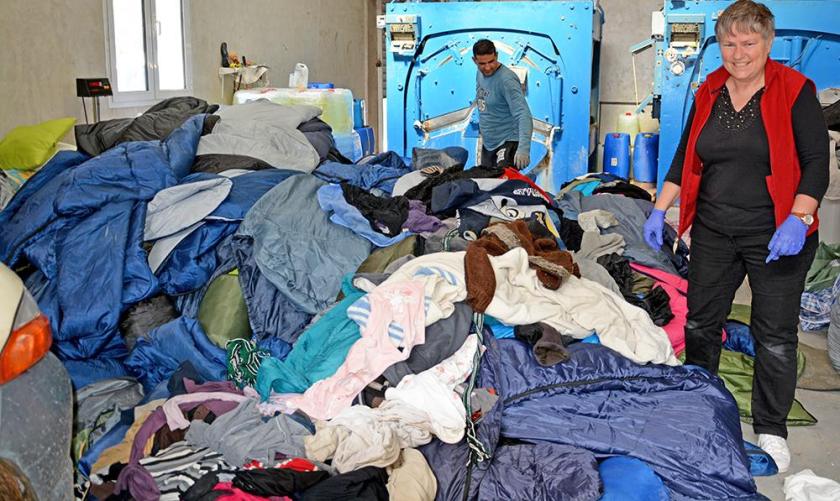Charity can be a double-edged sword, especially when practiced by people who are celebrities. It is true that their notoriety helps to highlight the issue they’re concerned with and bring it to the attention of the public, but how much difference does it make in actual fact? And how much of it is also used for their own advancement, the feeding of their own fame?
The latest example of this is Chinese artist Ai Weiwei’s espousal of the refugee crisis. He thought it a good idea (“art”?) to take a photo of himself lying on a pebbly beach, recreating the image of drowned infant Alan Kurdi that in 2015 became the defining symbol of the plight of Syria’s refugees.
This was seen as tasteless by many, as was his suggestion that high-profile celebrities don thermal blankets and take selfies at a gala event for the Cinema for Peace, for which he also wrapped the columns of Berlin’s Konzerthaus with 14,000 salvaged refugee life vests on Feb. 13.
Embed from Getty Images
At Idomeni camp on the Greek-Macedonian border, the dissident artist set up a piano in the middle of a muddy field and invited aspiring Syrian pianist Nour Al Khzam, from the city Deirez Zor, Syria, to play it.
The photographs of this event are a bit incongruous, since a light drizzle necessitated someone to hold a piece of plastic over girl and piano. The reviews I read were mixed – some characterized the event as ‘beautiful’ some as ‘ridiculous’.
Embed from Getty Images
It’s difficult to gauge the overall improvement in the victims’ situation resulting from such antics. If you’re stuck in a camp, cold and wet and uncertain about your future, are you overjoyed to see Angelina Jolie (another visiting celebrity), or would you rather have a hot meal?
That is why I admire people offering help on the ground, as it were. Small gestures sometimes, but which make a big difference. One would not even hear of them, were it not for some journalists seeking out these stories and writing about them.
Free Wi-Fi at Idomeni
One such article by journalist Lina Giannarou, written for the Kathimerini daily paper, tells of Ilias Papadopoulos, who decided to provide free Wi-Fi for the refugees trapped at Idomeni, on the Greek frontier. The border has been shut, these people are desperate for news, they need to communicate with their families; some have been separated from relatives on the way and want to look for them through social media.
Ilias Papadopoulos, a Greek electrical engineer who lives in Thessaloniki, a city about an hour’s drive south of Idomeni, built the necessary infrastructure inside an old trailer donated by the church in September 2015. He spent more than €5000 of his own money.
“I had the idea for free Wi-Fi at the beginning,” said Papadopoulos, who first went to the camp in August 2015 to see how he could help. “People had mobile phones, but no roaming, so they could not use them. They couldn’t communicate with their families.” He also found out hotels were asking people €5 to recharge their phones, so he showed up with large professional 80-slot plug boards, which he powered first with batteries and later using generators. In order to organize internet access, since phone signals in the mountainous area are weak, he borrowed two telephone lines from a local Evzone (army) unit and connected wirelessly to Idomeni.

Today his installation covers about 2/3 of the camp area. There’s still a problem, since the network’s capacity is for up to 900 simultaneous users, while thousands are trying to connect at any given moment. But, if you go near one of the eight antennas or try late at night, it’s easier. Using the network is free, but it is controlled – Ilias has blocked sites that are unsuitable for children or connected to criminal activities. He is now proposing to the authorities and the NGOs to use his network for information purposes, since he’s noticed a lot of the refugees don’t know what their options are and are still hoping the border will open soon.
Embed from Getty Images
The Dirty Girls of Lesvos Island.
This is their about page on Facebook:
When the refugees arrive on Lesvos in unstable, overcrowded boats, they are drenched with sea water. They are given new clothes and their perfectly good, but wet clothes are discarded and have mostly been trashed , adding to the environmental problems of landfill on Lesvos. Now Dirty Girls collect the clothes and have them laundered at a commercial laundry. They are sorted and distributed so they can be reused. Because of monetary donations, from people all over the world who want to help, we have been able to recycle many thousands of items of clothing.

Dirty Girls is the brainchild of Alison Terry-Evans, an Australian who has been going to Lesvos for years. Alison saw the littered beaches as an opportunity to recycle and simultaneously provide a service.
Local volunteers gather the dirty clothes from the sand and rocks, place them in bags, label them, and leave them by the side of the road. Alison’s team picks them up, gets them washed and dried, and then distributes the garments to the camps and outposts cropping up along the coast. Even heavy-duty blankets and shoes are sanitized so they can be put to good use.
Alison has always loved doing laundry. She says: “Sorting for me has always been a near meditation; so much satisfaction for little actual elbow grease. And finding a mate for the odd sock or shoe is super satisfying. So visiting the huge washing and drying establishment, Ermes, owned and run by Peter Mylonas, was thrilling.”
Peter saw Alison collecting clothing on the beach and heading home to wash and dry. He generously offered his assistance, and the rest is history.
Everyone on Lesvos loves Dirty Girls: the locals, the arrivals, the NGOs. Alison keeps the washing machines spinning thanks to private contributions. Want to help? Find Dirty Girls of Lesvos on Facebook.

Recycling to make bags for refugees
One of the often overlooked side effects of the refugee crisis in Europe is the massive amount of waste piling up on the islands at the frontline of the crisis.
Thousands of news arrivals are pouring onto the islands daily, leaving behind them on the beaches piles of rubber dinghies and thousands of life jackets.
Volunteers on the island of Lesbos have developed a novel approach to dealing with some of the waste by upcycling the rubber from the boats and the straps from the life vests into waterproof bags.
Twenty-four-year-old Amsterdam native Floor Nagler had been volunteering on the island helping people disembark from boats when she noticed a need for bags, since many people had lost theirs along the route.
Nagler brought some of the material back to Amsterdam, where she is studying textiles, and worked with a fellow Dutch artist until they up with a solution. Then they took the concept back to Lesvos where they held workshops outside the Moria reception center near the capital city, Mytilini.
The bags are made from one folded piece of discarded material from the boat, held together with rivets and clipped shut with buckles from life vests. The bags costs around $3 to make and can be assembled by hand.

This is not the first project that Nagler and others have set up in upcycling materials on the island that were once destined for landfills.
Back in January, Nagler was making mattresses out of the life jackets that were left behind. Along with a group of volunteers, she founded the It Works initiative to bring empowering skills to the refugees who arrive on the island.
You can watch Floor making her bags on YouTube, below:


This is a lovely story/post. Thank you. I hope it inspires others to help…..
LikeLiked by 1 person
Thank you for this informative post. It was one of them that lead me to follow your blog after all.
I think that maybe celebrities can create awareness for the masses, but they only help little on location… Your blog does create awareness too, maybe not for the masses, but it is awareness that provides details that those celebrities won’t provide.
LikeLiked by 1 person
Thank you for sharing with us. It is very inspiring!!
LikeLiked by 1 person
Tasteless art. Those on the ground giving help are the real celebrities. My admiration is infinite.
LikeLiked by 1 person
Great post – especially about the reusing. I also agree that celebs are pretty useless when it comes to pontificating about crisis – its like many of them over here came to visit flood sites, when people are struggling to find a place to sleep for the night as their home has been washed away.
LikeLiked by 1 person
Adding my thanks to you for sharing news about these wonderful “on the ground” volunteers who have done so much to actually help refugees in useful ways.
LikeLiked by 1 person
There is such beauty in humanity.
LikeLiked by 1 person
A great post! Inspiring to hear the stories of ‘those on the ground’ making a difference. The celebrity issue is a knotty one. Ultimately if it helps bring the problem into focus then I guess the celebrity benefiting is something I can live with.
LikeLiked by 1 person
I guess my feeling about the celebrities depends a bit on their motivations for acting as they do. With at least some of them, their activities seem rather self-serving. With others, I imagine they’re genuinely trying to help, although whether or not they actually succeed is another matter.
The examples of ordinary people doing things away from the limelight are far more uplifting. They clearly do make a big difference to the lives of those they help and their motives for getting involved are beyond reproach.
LikeLiked by 1 person
One of the most perceptive, informative reports on the extraordinary efforts ordinary people in Greece are doing to help the refugees.
LikeLiked by 1 person
Thank you. Of course, it’s never the whole story. There are plenty of others taking advantage of them, or griping about them or even being nasty on social media and in comments in the papers. But on the whole there’s a healthy reaction against that. What really needs to be controlled is the trafficking, abuse and criminal activities (such as forged passports) surrounding the whole issue.
LikeLike
One of the most informative, perceptive reports on the extraordinary efforts ordinary people in Greece are making with the refugees
LikeLike
There is so much beauty in those who are humbly helping even when no one’s looking.
LikeLiked by 1 person
What an interesting post! I think they would want a hot meal to be honest. Having been to Syria many times, even when there was peace it was a very poor country and people were happy to have clothing and fruit! I agree with the comments that everyday people and their help seems much more impressive!
LikeLiked by 1 person
Thanks everyone for your kind comments. There are always many sides to things – I just thought I’d report on some of the interesting initiatives I came upon.
LikeLiked by 3 people
yes very interesting!
LikeLike
So much humanity, the best and the worst and the in-between. Thank you for this perceptive analysis.
LikeLiked by 1 person
Usually the famous have as little idea as the rest of us about the best thing to do. Sometimes they get it right, often they don’t. The lesson from your post might be that the best thing to do is to go there and see what needs to be done and work out if you can do it. Those are the things that seem to have worked.
LikeLiked by 2 people
This is why I’m an admirer of Sean Penn since he goes where the problem is and works out the reality and tries to do something about it. If he speaks on a cause, I listen. Almost by the by I think he’s an excellent actor!
LikeLiked by 1 person
I agree. One can never generalize.
LikeLiked by 1 person
A wonderfully thoughtful and inspiring post. There’s nothing like a practical helping hand in a crisis – I totally agree.
LikeLiked by 1 person
Even in the small corner of Cornwall where I live, word about the Dirty Girls has filtered back. Thanks for a fine post.
LikeLiked by 1 person